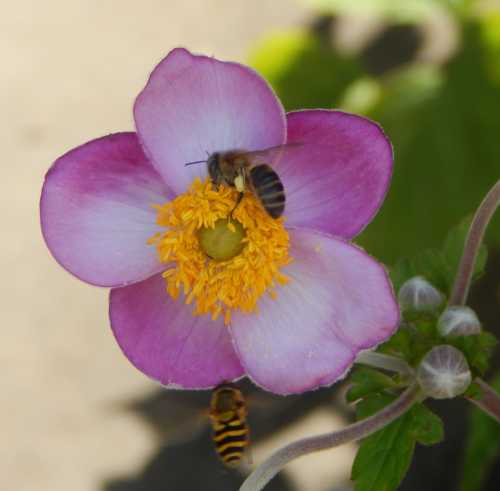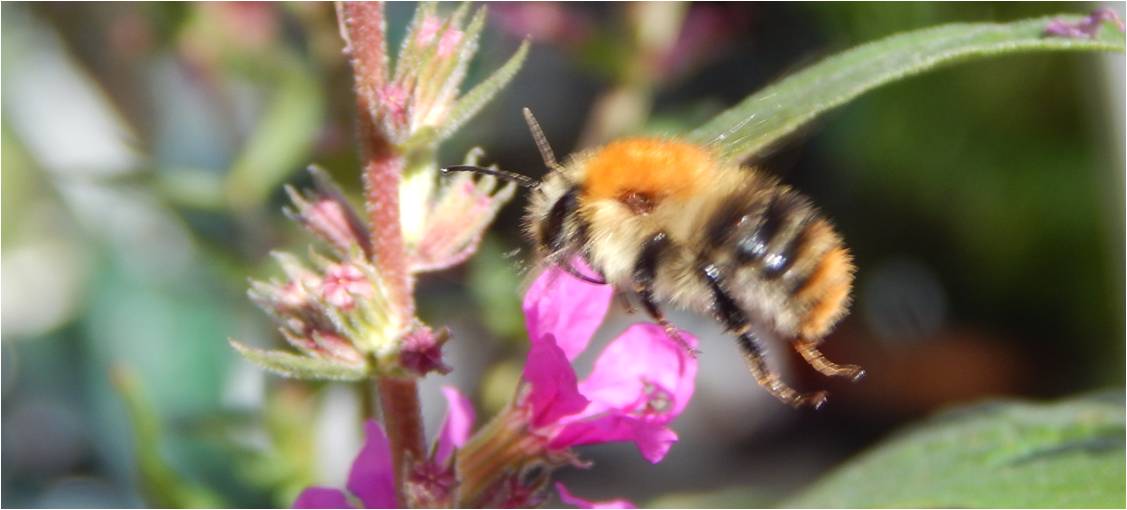Day of International Demonstrations to Save Bees from Neonicotinoid Pesticides
Here is a rough Google translation from a French news report:
"After denouncing the evils of the Neonicotinoid Pesticide
'Cruiser' at the world Bee-Congress 'Apimondia', French beekeepers
organise protests in major cities for the day of October 15, 2011".
Confronting
the threat posed to bees emerging from winter quarters, by the
neonicotinoid insecticide 'Cruiser' used on canola/ rapeseed, French
beekeepers will take to the streets, parading in their bee-suits with
banners and bee-smokers, on October 15, 201.
 Honey bee foraging on Japanese anemone.
Honey bee foraging on Japanese anemone.They feel compelled to act in the face of widespread bee-deaths, resulting from the use of Cruiser and the repeated ministry -authorisations for the use of Cruiser on maize, despite the over-turning of these ministerial decisions by the French Council of State in February 2011.
Beekeepers say they are
confronting years of ignorance and inaction on the part of the French
government, which has failed to deal with the destruction of half of all
French bee-colonies, killed by neonicotinoid insecticides in recent
years.
Attacked from all sides by pesticides, insecticides
and fungicides, honeybees, bumblebees and butterflies could become
extinct as quickly as the dinosaurs.
After the Apimondia
conference of September 2011 in Argentina, European beekeepers denounced
the massacre of their bees by the insecticide Cruiser.
French
beekeeping leaders have taken the initiative to mobilize nation-wide
street-demonstrations to demand Justice and try to save their bees.
For
month after month, tens of thousands of beekeepers have watched their
hives dwindle and die during blossom time
Several trade-unions are preparing regional events on October
15th, against the authorization of the pesticide Cruiser OSR for use on
rapeseed (canola).
The French departments of Isere, Lot-et-Garonne and all of Burgundy are already mobilized for the protest day.
The pesticide Cruiser (thiamethoxam, fludioxonil and metalaxyl-M) is dangerous for human health, fatal to the bee.
The
National Union of French Apiculture (UNAF), which brings together most
regional bee co-operatives, launched the campaign, after Cruiser OSR
received official authorisation last June; they have attacked this
licensing decision in the courts.
Under pressure from beekeeping
leaders, government deputies and senators have asked more than 130
parliamentary questions on the issue.
Anne Furet, project manager for the National Union of French Apiculture (UNAF), reached by telephone, said:
- "Since
the mid-90s, French beekeepers have witnessed the failure of hundreds
of thousands of colonies, increasing bee-deaths, and the disappearance
of entire apiaries and businesses.
Annual production of French honey fell from 40,000 tonnes, for the period 1988/1994, to just 20,000 tons in 2010; a loss of 50%.
Our observation of the bees and discussions with neighboring farmers, led us to suspect that the use of new systemic pesticides was responsible for these disorders.
Our doubts were confirmed when scientists from INRA and CNRS established a causal link between neonicotinoids and bee-deaths.
The
neonicotinoids are a class of neuro-toxic insecticides which have been
on the market since 1994. They include preparations such as the Gaucho
(Imidacloprid), Cruiser (Thiamethoxam) , or Proteus (deltamethrin,
¬thiacloprid;).
All these systemic pesticides are toxic for bees at
every stage of the growing cycle: at the seedling stage, and during
flowering; but there is also added danger of poisonous guttation, or
sap-exudation, (an important source of water for bees).
Leaders of the beekeeping fraternity are unanimous in their judgement that these insecticides cause serious damage to bee colonies and jeopardize the national production of honey ...."
The behavior of the Minister of Agriculture worries beekeepers. Beekeeping leaders have unanimously deplored the irresponsible decisions of the Agriculture Minister, Bruno Le Maire.
At the forefront of this fight,
the president of the Ardèche and Drôme Beekeepers denounces the
genocide of the bees:
- "By granting a license
for Cruiser OSR, the Ministry of Agriculture has permitted the coating
of canola seed with a neonicotinoid insecticide, despite the danger this
poses for the bees.
In spring, Canola or oilseed rape is a vital early source of nectar and pollen that can feed and restore bee-colonies after the hard winter.
If bee-colonies are damaged by this new pesticide from early springtime, the entire beekeeping season could be threatened.
In several regions, currently, the honey from oilseed-rape provides over half the income of many French beekeepers."
The insecticide Cruiser is very hazardous to health
National
leaders of the UNAF recently asked ANSES to hand over their studies and
assessments of the effect of Cruiser on bees, so that they could judge
the validity of these tests independently.
But having seen the documents provided by ANSES, it seems that these tests do not comply with the law, in terms of what is needed to assess the impacts of these pesticides on bee colonies; (Durations of Exposure to the pesticide were too short, areas of crops treated with the pesticide were too small etc.)..
Anne Furet explains:
- "The tests carried out by
ANSES do not assess the possible toxic-synergy effects of the three
different active-substances contained in Cruiser OSR (thiamethoxam,
fludioxonil and metalaxyl-M).
They only tested each active substance individually; they did not investigate, or exclude, possible toxic-synergies between the combined effect of these substances.
This methodology, does not meet our national obligations regarding the authorization of a pesticide such as Cruiser OSR, and there is strong evidence that such toxic synergy does exist, since Bayer has a patent on that very characteristic.
INRA scientists have confirmed that the "active substance" thiametoxam found in Cruiser and Cruiser OSR 350, led to proven bee-colony deaths (thiamethoxam is 5,400 times more toxic for bees than DDT). "
Last April, Slovenia
banned the use of Cruiser 350, because of excess mortality of bee
colonies.
In late June, Italy renewed its ban, on the use of
neonicotinoid insecticides on corn, for the third consecutive year.
A few days later, Italy published a study of the evolution of bee colony deaths in the maize-growing regions of Italy. These have fallen from 37.5% over the period 2007-2008 (before the ban on neonicotinoids), to just 15% for the period 2010 - 20112 (after the ban on neonicotinoids).
Please note, bee-colony-mortality is averaging 30% in the other countries of the European Union (Germany, France, Spain, UK, Holland, Belgium, Poland etc.)
How Can Councils Help The Bees?
Ideas To Share






